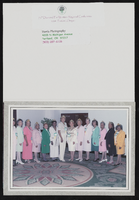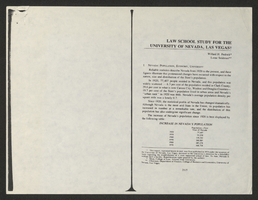Search the Special Collections and Archives Portal
Search Results

Alpha Kappa Alpha Sorority 75th Far Western Region conference materials
Date
Archival Collection
Description
From the Alpha Kappa Alpha Sorority, Incorporated, Theta Theta Omega Chapter Records (MS-01014) -- Chapter records file.
Text

Rocio Rodríguez-Martinez oral history interview: transcript
Date
Archival Collection
Description
Oral history interview with Rocio Rodríguez-Martinez conducted by Elsa Lopez and Monserrath Hernández on June 21, 2019 for the Latinx Voices of Southern Nevada Oral History Project. Rocio shares her personal history growing up in Bogotá, Colombia and how she immigrated to the United States. She talks about motherhood, her Latina identity, and her experiences raising her daughter in Los Angeles and Las Vegas with her husband. Rocio also discusses her employment history and how she was able to achieve her professional goals of becoming a Spanish and English teacher for the Clark County School District (CCSD)'s Family and Community Engagement Services (FACES) program. Her interview is conducted in Spanish. Subjects discussed include: Bogotá, Colombia; El Salvador; Family and Community Engagement Services (FACES).
Text

Law School Study for the University of Nevada, Las Vegas from Southwestern-Nevada Law Review
Date
Archival Collection
Description
A loose paper version of "Law School Study for the University of Nevada, Las Vegas" by Willard H. Pedrick and Lorne Seidman, photocopied from the Southwestern-Nevada Law Review, Volume 10, 1978. From the University of Nevada, Las Vegas William S. Boyd School of Law Records (UA-00048).
Text

Transcript of interview with Bruce Layne by Claytee D. White, June 18, 2004
Date
Archival Collection
Description
Bruce Layne came to Las Vegas in March of 1955 when he was 10 years of age. He attended High school at Bishop Gorman and college at the University of Nevada Las Vegas where he received a B.S. in Economics. In college, he played baseball for three years and was named All Conference Player in 1966. Growing up in Las Vegas, two of his closest long time friends are Governor Bob Miller and Tito Tiberti. Bruce later went on to become the President of Layne & Associates Insurance which was the largest Insurance Agency in Nevada. Bruce tells fabulous stories of his 40-year experience in the Las Vegas community. When he first arrived there were only about 25,000 people living here. Since then, Bruce has been witness to the enormous growth the city has undergone. Throughout the interview, he discusses his book, My Gift, which he wrote after he discovered he had Parkinson's disease in 1999. The book contains valuable advice on life and it has touched the lives of many people who have read it. Today Bruce Layne is relentlessly fighting his battle with Parkinson's disease both for himself and for thousands of others. He continues to have a positive attitude and is supported by his wife, Sherry Layne, and his two sons, Chad and Trevor. VI
Text
Temple Beth Sholom
Temple Beth Sholom was the first Jewish congregation in Southern Nevada and continues to function as a religious, educational, and social center for a considerable portion of the Jewish community of Las Vegas. Previously known as the Jewish Community Center of Las Vegas, it became affiliated with the Conservative Movement and officially known as Temple Beth Sholom in 1958. The congregation originated in Las Vegas in the 1930s with a small group of families and grew to be the largest temple in Nevada during the 1960s.

Charles Scott Emerson oral history interview: transcript
Date
Archival Collection
Description
Oral history interview with Charles Scott Emerson conducted by Claytee D. White on December 21, 2017 for the Remembering 1 October Oral History Project. In this interview, Charles Scott Emerson discusses his work with the American Red Cross and the disaster relief the organization provided during the aftermath of the October 2017 mass shooting in Las Vegas, Nevada. The interview begins with a discussion on Emerson's early life and career in Missouri and how he moved to Las Vegas in 2004. Emerson talks about the American Red Cross response plans and coordinated operations that are in place for when the community is faced with a disaster, going into specific detail on the community-wide response to the October 1, 2017 shooting. He gives a behind-the-scenes glimpse into how relief work is organized, using this interview as a chance to praise the hidden heroes of the October 2017 tragedy, including the people at the Family Assistance Center, the Attorney General's Office, the Driver's License Bureau, and the Coroner's Office, as well as mental health providers, child care workers, blood donors, and more. Throughout the interview, Emerson puts special emphasis on the importance of community in order to offer support in the aftermath of a tragedy as well as to prevent a man-made tragedy from occurring again.
Text

Michael Chin oral history interview: transcript
Date
Archival Collection
Description
Oral history interviews with Michael Chin conducted by Jerwin Tiu, Cecilia Winchell, and Stefani Evans on December 20, 2022 and January 12, 2023 for Reflections: the Las Vegas Asian American and Pacific Islander Oral History Project. In this interview, Chin describes growing up in a largely Americanized household. His paternal grandparents immigrated from China and owned a laundry shop that his father worked in as well. Chin discusses his education and his interest in creative writing, including editing the school newspaper and writing an a cappella blog with his friend while in college. After graduating, he worked at the John Hopkins Center for Talented Youth as a resident assistant before getting into a graduate program and obtaining his MFA.
Text

Kevin Chung oral history interview: transcript
Date
Archival Collection
Description
Oral history interview with Kevin Chung conducted by Cecelia Winchell, Stefani Evans, and Jerwin Tiu on December 18, 2021 for Reflections: The Las Vegas Asian American and Pacific Islander Oral History Project. Kevin Chung discusses his upbringing in Southern Vietnam and how he and his family were forced to leave the country during the Vietnam War. Chung talks about his family's migration to Minnesota and how they adapted to American culture. He shares his educational background, his professional pursuits as a teacher, and the reasons he and his wife decided to move to Las Vegas. Chung reflects on the importance of STEAM (Science, Technology, Engineering, Art, and Math) in education with an emphasis on the arts and shares his teaching philosophy. He also gives details of his family's lives and talks about the importance of bringing together his Vietnamese and American cultures to connect the different generations of his family.
Text

Dr. Deborah Kuhls oral history interview: transcript
Date
Archival Collection
Description
Oral history interview with Dr. Deborah Kuhls conducted by Barbara Tabach on December 29, 2017 for the Remembering 1 October Oral History Project. In this interview, doctor Deborah A. Kuhls describes the preparation and procedures implemented at the University Medical Center of Southern Nevada (UMC) during the night of the October 1, 2017 mass shooting in Las Vegas, Nevada. She describes her experiences from that night and into the next morning, starting from when the trauma center first learned about the shooting to when patients began arriving. She goes into detail on the hospital's Military-Civilian Trauma System Partnership, which allowed for the installation of a second trauma area to treat the large volume of patients. In addition to the events at the hospital, Kuhls talks about the flurry of activities during the week of the shooting, including interviews with various media, the statewide meeting for surgeons, fellows, and residents where "stop the bleed" training was provided, and general meetings with various government officials, including Donald Trump. Deborah Kuhls also discusses the emotional impact of the shooting and its aftermath as well as her goals for the future of trauma in the medical field.
Text
